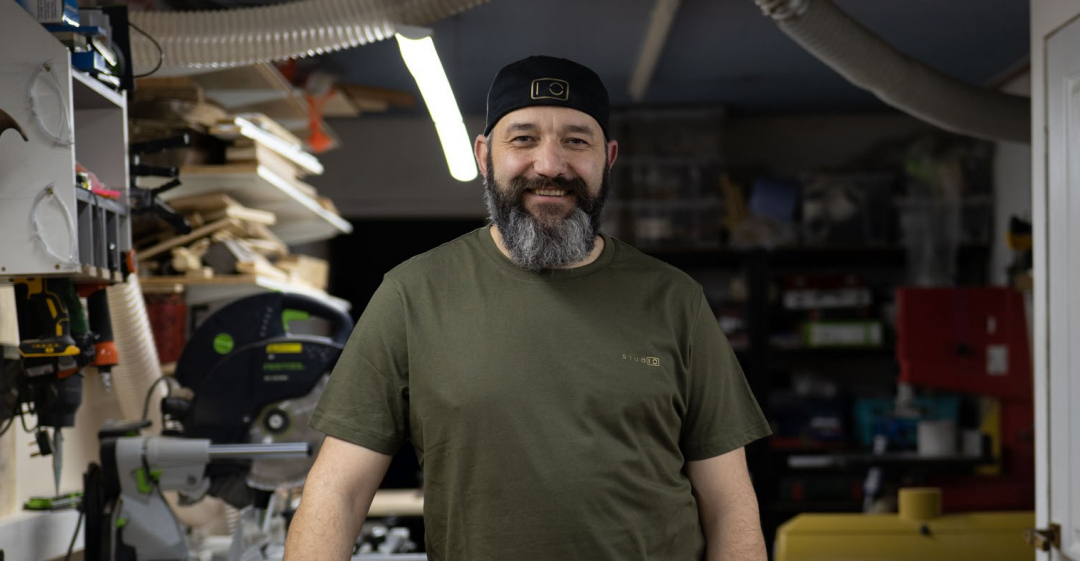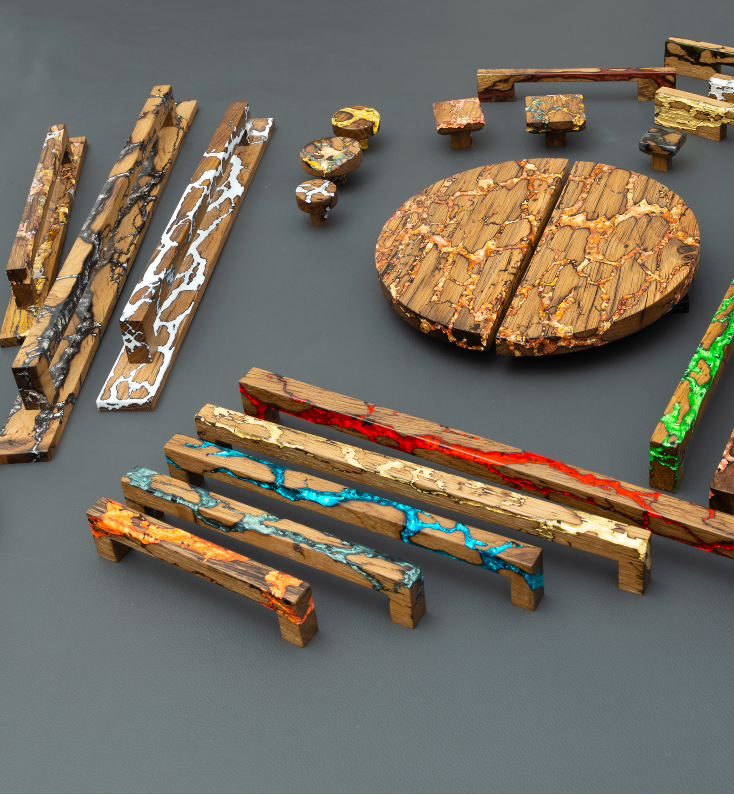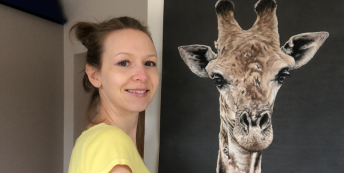“I’d been coming home from work very, very grumpy, which didn't help my relationship with my wife or kids.”

What work were you doing previously?
For fifteen years I worked in food development for major food companies.
I worked in various research and development roles, including and up to development manager.
What are you doing now?
I'm a woodworker, designer and artist, working in my workshop.
I prime, sculpt, and produce wooden cabinet and door hardware, handles, pulls and knobs, made out of reclaimed wood from historic buildings.
I have developed a technique which creates extraordinary visual effects.
Two hours of my day are spent on business admin, then the rest of the day I have my maker's hat on. I currently run the business on my own with a massive help from my wife.
How did you feel in your work before you decided to make the change?
The first twelve years of my R&D career at my first food organisation were absolutely fantastic.
I felt valued, and I was motivated. I came to the business with limited English language skills (I’m originally from the Czech Republic), but people believed in me, gave me opportunities to grow, which I grabbed and never let go. I was in a very supportive and friendly environment.
Towards the end of those twelve years I was in a phase of complacency, boredom perhaps. I was not challenged enough, feeling that I couldn’t offer any more after twelve years and I made the change to a different food company. This was the beginning of my new journey.
After three months with this employer I realized that it was the wrong step. It's the old cliché of ‘you don't know what you've got until it’s gone’, and this was the case. The new workplace was horrible from many aspects, let’s just say the complete opposite of the one I left.
Why did you change?
I wanted and needed to leave this employer, and at the time, the plan was a job change rather than a full career change.
I had applied for product development roles in other food companies. Each time I got all the way to the last two candidates, and on one occasion I was the last one, but never got the job.
It was an emotional rollercoaster to get so close every time, and it slowly became clear that I needed to do something radical.
When was the moment you decided to make the change?
The biggest change in my thinking came on Christmas Day, the year before the pandemic started.
A few weeks before the holidays, I found out I wasn't going to be able to start a job that I'd been effectively hired for (the business lost some contracts and could not hire me anymore).
So I rethought everything. I put a blank sheet of paper on the table and started to write out my thoughts about what I could do now, and what I would like to do in the future. What if a similar job would be the same as before, with the same selfish boss, the same bad environment? Would I want to go through this again?
I was coming home from work very, very grumpy which didn't help my relationship with my wife and kids. So I made the decision that I have to put the happiness of myself and my family before my career path.
How did you choose your new career?
While I was rethinking my next steps, I listed out my skill set and personal qualities.
I'm very creative, I'm extremely manually skilled, I like and can make things, I'm comfortable with changes (I'd changed the country I’m living in and didn't have a problem with that). I'm adaptable, confident, success-driven and stubborn.
When I combined all of the above, the decision was to make something… anything! I’ve worked with metal before – my grandfather was a blacksmith and when I was a child I was in and around his workshop every day.
During that Christmas break I downloaded the Tik Tok app and saw something made out of wood and resin. I thought ‘this is awesome, but I could do something better and something different’. I wondered what I could do that was different, and five seconds later I came up with the idea of door handles. How random!
I didn't consider any other options at this point. This comes back to my stubbornness and also my love of problem solving. There were hundreds of challenges waiting for me. The very next morning I had a list of woodworking tools ready to buy, and after the Christmas break, the new era of my life started.
From that point I just knew I would make the big change eventually, I just didn't know exactly when that point would come, because I still had a young family and a mortgage to pay. But I was confident I would do this (design, make and sell my own products) one day.
Are you happy with the change?
Yes, extremely happy.
As it's my own business, I’m living and breathing it every minute, and it’s challenging at times. It's probably the same for anyone who runs their own business.
But I can’t imagine going back to an office creating paperwork just for the sake of it.
I used to work to live, but now I live to work.
What do you miss about your old career?
There’s not much I miss, because I'm still in a very creative environment now as I was before.
I liked to have a bit of a chat with colleagues now and again, but this has been replaced with a chat with customers.
But I do miss traveling. I had traveled the world as a development manager looking for technology, which was great fun and a learning experience.
How did you go about making the shift?
After I started to think about making my own products over Christmas, I started working in my garage, purchasing tools and experimenting with different processes.
I spent all of my free time drawing and designing, working out the process of making these products out of wood to combine function with beauty. I wanted to crack it. I loved the challenge.
Then the pandemic and first lockdown came. Suddenly I was working from home with many of my work projects canceled. I couldn't do factory trials or visits. So I was working much less hours at my job that was paying the mortgage, but gained massive amounts of time in the day to work on the development of my products and techniques. My day started at 5am and ended at 8pm (this has not changed much since though).
Without being in lockdown I probably wouldn't have been able to make the shift. As devastating as Covid was for some, looking back, I have to say that in normal circumstances (where I would have been leaving the house to work), what took me six months due to the lockdowns could have taken three years, and I’m not sure it would have been sustainable.
Later, during the first autumn of the pandemic, I was happy with the creation of my wooden door handles, and we applied for a design award in London and got Silver. We also received a very prestigious award in Italy half a year later.
So I was already an award winning designer, but I could not share my greatest achievement yet. I was waiting for when the time was right, so I continued with my old job for a little while. A slow return to the office meant I could not spend as much time on my business as I needed.
I handed in my notice to start my new journey the following summer, about a year and a half after I’d had the initial idea of making wooden door and cabinet hardware.
Although I was naive at the beginning and very heart-driven rather than brain-driven, I was very careful about the shift.
How did you develop (or transfer) the skills you needed for your new role?
In terms of the making process, and running a business, I have had to learn everything.
I've developed a technique that no one has done before, and I've learned how to use tools I'd never used before. I knew I have hands that could make and a brain that can create, so it was just about making logical steps along the way.
I've learnt a little bit about social media. I've never really used them before, but it's become a bit of a must for a small business, though my wife is doing most of this.
I had learnt how to create a website, but it was apparently so bad that my wife stepped in again and saved me.
I’ve had to learn everything about sales, how to price products, how to negotiate with dealers when selling my products etc. This was so new to me and difficult.
My presentation skills have allowed me to pitch my ideas to dealers around the world.
The other skill I have transferred is innovation, continuous improvement and critical thinking, which was a bread and butter part of my past career. Using these skills allows me to approach certain problems from a different angle, that perhaps ordinary woodworkers wouldn’t.
How did you handle your finances to make your shift possible?
I was able to begin the process of developing and making while I was employed.
This was a big help, meaning I was not in a hurry or under critical financial pressure.
Beyond our main household bills, all the money went on product development and professional tools, so it was not cheap and easy, but manageable.
Soon after I'd made the switch, I was able to get a grant from the local council which helped a lot to upgrade my tools to a level required for precise woodworking.
I expected that I wouldn't make as much money in the first year, compared to that of a decently-paid food developer, but I was determined to make it a success. Now the business has grown to where we want it to be, and we have 15 high-end dealers representing our brand in America and Canada, five in Europe and the list of UK dealers is expanding every week.
What help did you get? 
I have to come back to my wife
The first year before the switch was very expensive, so the “blessing” from my wife saying 'go ahead, I can see this could go somewhere' was the most important part of the whole process.
She never stopped supporting me and the business in terms of paperwork, invoices, web design, while looking after the kids. She also has her own career, and I can’t thank her enough.
I also had help from my brother-in-law and his partner, and a couple of friends who helped me to build my workshop, and whenever help was needed.
The Maws Craft Centre, where we are based among other makers, artists, and shops, have been very helpful to get me on my feet.
What have you learnt in the process?
I’ve learned to appreciate feedback.
When customers come to the workshop and say ‘wow I've never seen anything like this before, this is beautiful’, and they ask about how it's made – I've learnt to really enjoy those moments, which I never did before at work.
Hard work and determination (sometimes desperation) can take you over the obstacles you would face. I’ve also learned to focus on what’s important, and to not deviate from the path – meaning until good turns into perfect I won’t move on. Persistent consistency! I could have easily given up after many failures or kept snoozing the 5am alarm in the morning.
Lastly I’ve learned I can only work and give 100% on something I believe in and that I'm passionate about. That could be difficult in my previous job, or in fact at any job as an employee.
What would you advise others to do in the same situation?
Give it a go.
Life's too short to drink bad wine (my dear friend told me that and he is right), and it is the same with the job you do.
Do not let it go too far (as I had done) to the point of desperation, as this could have a long-term effect, however at the same time consider all options and help available, before you quit.
Being naive could be a great asset at the beginning (this can free up the space and thinking process), but you need to blend this very soon with being realistic and logical.
The reward, when you push yourself out of your comfort zone and succeed (whatever the word success means to you), is soooo sweet.
The most important thing I’ve discovered is that my work has purpose, and this has transformed almost everything in my life.
One artist friend told me that if you wake up Monday morning and you can’t wait to get to work, you are winning in life.
To find out more about Jiri’s business, visit www.studionumber10.co.uk



